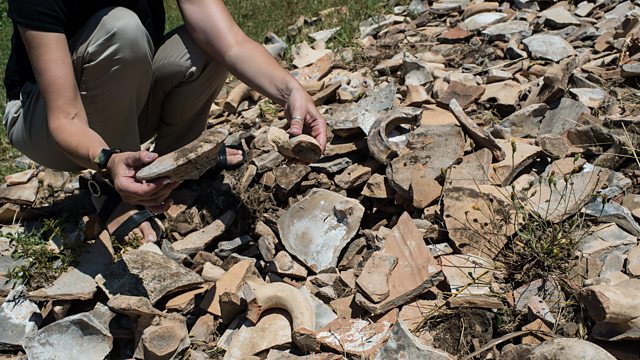The History of Wastefulness: Rubbish Through the Ages
Alexandra Spring discovers how three historical landmarks shaped modern attitudes to waste.
Alexandra Spring continues her exploration of how our relationship with rubbish has evolved through time at the foot of Monte Testaccio in Rome - a hill built of 53 million discarded olive oil amphorae, which were thrown away nearly 2000 years ago. She meets the architect Tom Rankin, who shares how this ‘dump’ is indicative of the Roman spirit to waste.
Moving through the decades, the historian Agnes Sandras takes Alexandra back to France in 1883, when Parisian Prefect Eugene Poubelle sparked public outcry by forcing citizens to buy a box in which they would place their waste. They discuss how this early form of a modern day ‘bin’, or ‘poubelle’ in French, shaped how people viewed litter.
Then, sharing her view on how our attitudes to waste have changed throughout the last century, professor of history Eiko Maruko Siniawer explains to Alexandra how a shift in ideology to embrace modern luxuries saw waste spiralling out of control at the end of the World War Two.
Producers: Chelsea Dickenson and Ben Cartwright.
(Photo: A woman holds pieces of ancient amphorae at Monte di Coccio alias Monte Testaccio ( Mountain of Crock), in Rome. Credit: Getty Images)
Last on
Broadcasts
- Wed 16 Jan 2019 03:32GMT91�ȱ� World Service Online, UK DAB/Freeview, Europe and the Middle East & West and Central Africa only
- Wed 16 Jan 2019 05:32GMT91�ȱ� World Service Australasia, Americas and the Caribbean, South Asia & East Asia only
- Wed 16 Jan 2019 13:32GMT91�ȱ� World Service except News Internet
- Wed 16 Jan 2019 18:06GMT91�ȱ� World Service Australasia
- Wed 16 Jan 2019 21:06GMT91�ȱ� World Service East and Southern Africa & West and Central Africa only
- Wed 16 Jan 2019 23:06GMT91�ȱ� World Service except East and Southern Africa & West and Central Africa
- Sat 19 Jan 2019 17:32GMT91�ȱ� World Service News Internet
- Sun 20 Jan 2019 10:32GMT91�ȱ� World Service
Podcast
-
![]()
The Compass
With ideas too big for a single episode, The Compass presents mini-series about society



